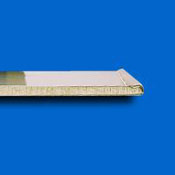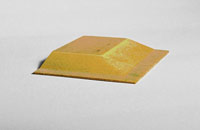FITS thermoplastic sandwich panels offer new ways of thinking and designing
Sandwich constructions are considered the materials of choice for use in all kinds of transport applications in which weight reduction is an essential consideration. Existing sandwich panels fulfil almost all the requirements with flat panels having very low weight but they suffer difficulties with economic shaping and forming to end part level.
To provide customers with excellent freedom of design utilizing sandwich panels, the FITS thermoplastic sandwich panel and FITS application technology have been developed.
FITS (Foamed In–situ Thermo-formable Sandwich), consists of a thermoplastic structural foam core with fiber reinforced thermoplastic facings made in one production step. The structural core is fully integrated in the fiber reinforced thermoplastic facings and FITS thermoplastic sandwich panels require no adhesive. Because of the manufacturing process, a uniform sandwich panel is produced with a typical an-isotropic core cell structure.
FITS thermoplastic sandwich panels have:
- Excellent compression strength and modulus
- Good shear properties
- High bending strength and stiffness
Compared to honeycomb sandwich panels the FITS thermoplastic sandwich panels have totally supported facings, which provide breakthroughs in weight reduction and cost savings in end part applications, especially with larger production quantities.
The advantages of FITS thermoplastic sandwich panels are:
1) Weight savings at end part level.
2) Simple and low cost shaping and forming giving much greater freedom of design
3) Considerable cost savings at end part level
1) Weight savings at end part level
Let us explain by an example, a typical first question asked by a designer of interiors of an aircraft is:” What is the density of the core?”
The answer is 80 - 90 kg /m3 (5 – 5,6 lb/ft3), as a foam core is always heavier then a honeycomb. Too heavy is a typical reaction. But FITS panels do not have an adhesive layer, so the adhesive weight can be added weight of the structural foam core, ending with a panel weight about the same as the honeycomb panels, up to a thickness of about 15 mm(0,6 inch).
Typically in honeycomb constructions 25% of the panel weight is added to the part weight through the application of potting compound, fillers, paint, a decorative layer, connections, etc..
By contrast, with FITS thermoplastic sandwich panels, only 5 % weight is added at part level.
Conclusion: FITS panels provides you with weight savings at end part level
2) Simple and low cost shaping and forming which gives much greater freedom of design:
Ease of folding, without weight reduction.

Simple integrated edge protection also adding strength and stiffness.

Panel integration: 30 sec./edge

Part integration: Welding, i.e.: low weight fiber reinforced thermoplastic inserts.

3) Considerable cost savings at end part level
Significant savings in the manufacturing costs can be obtained by using dedicated equipment, especially with larger quantities.
FITS Technology has gained experience with PolyEtherImid (PEI), as a material for the thermoplastic structural core alongside fiber reinforced thermoplastic facings in their FITS sandwich panel.
Applications include all interiors of aircraft, trains, boats, etc. which require low flammability, smoke and toxicity (OSU values<30/15; Ds<5).
In principle most amorphous thermoplastic polymers can be used in the FITS sandwich manufacturing technology, creating a wide variety of application opportunities in various industry segments.
Last but not least, FITS panels are sustainable and totally recyclable.
FITS panels will be commercially available in the course of 2008.
For any questions, please contact:

FITS Technology
Postbox 45
3970 AA Driebergen
The Netherlands
Phone: ++31 (0)343 510313
Fax: ++31 (0)343 539949
E-Mail: info@fits-technology.com
Website : www.fits-technology.com
Related Articles:
Thermoplastic vs Thermoset Resins
The Sandwich Panel Core
Composite Sandwich Glossary